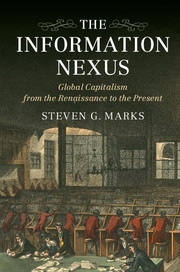Crossref Citations
This Book has been
cited by the following publications. This list is generated based on data provided by Crossref.
Franklin, Simon
and
Bowers, Katherine
2017.
Information and Empire: Mechanisms of Communication in Russia, 1600-1850.
Marks, Steven G.
2018.
‘The Global Legacy of the Russian Revolution: A Comparative Perspective’.
Revolutionary Russia,
Vol. 31,
Issue. 2,
p.
152.
Dukes, Paul
2018.
The Global Legacy of the Russian Revolution: A Comparative Perspective.
Revolutionary Russia,
Vol. 31,
Issue. 2,
p.
175.
2019.
Isis Current Bibliography of the History of Science and Its Cultural Influences 2019.
Isis,
Vol. 110,
Issue. S1,
p.
21.
de Bromhead, Alan
Fernihough, Alan
Lampe, Markus
and
O’Rourke, Kevin Hjortshøj
2019.
The anatomy of a trade collapse: the UK, 1929–1933.
European Review of Economic History,
Vol. 23,
Issue. 2,
p.
123.
Franklin, Simon
2019.
The Russian Graphosphere, 1450-1850.
Lukasiewicz, Mariusz
2021.
Bourses, banks, and Boers: Johannesburg’s French connections and the Paris Krach of 1895.
Economic History of Developing Regions,
Vol. 36,
Issue. 2,
p.
124.
Dover, Paul M.
2021.
The Information Revolution in Early Modern Europe.
O'Sullivan, Michael
2021.
Vernacular Capitalism and Intellectual History in a Gujarati Account of China, 1860–68.
The Journal of Asian Studies,
Vol. 80,
Issue. 2,
p.
267.
Evans, James
and
Johns, Adrian
2023.
Introduction.
Osiris,
Vol. 38,
Issue. ,
p.
1.
Bholat, David
2023.
Virtuous bankers: a day in the life of the eighteenth-century Bank of England.
Business History,
p.
1.
Lang, Heinrich
2023.
L’economia della conoscenza: innovazione, produttività e crescita economica nei secoli XIII-XVIII / The knowledge economy: innovation, productivity and economic growth, 13th to 18th century.
p.
115.
Miller, Nicola
2024.
Republics of Knowledge Revisited.
Global Intellectual History,
Vol. 9,
Issue. 3,
p.
329.



